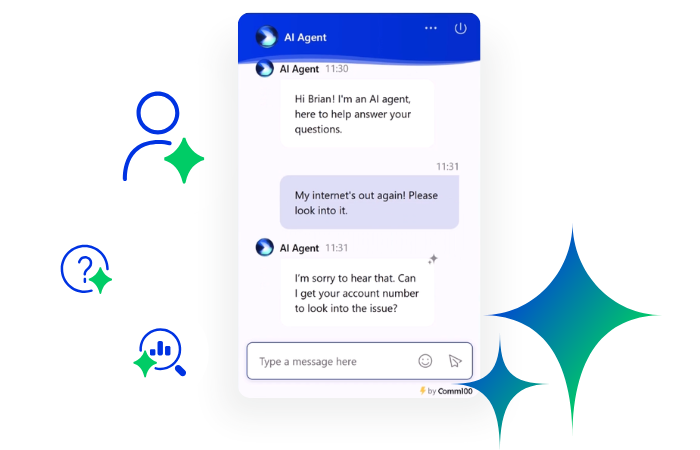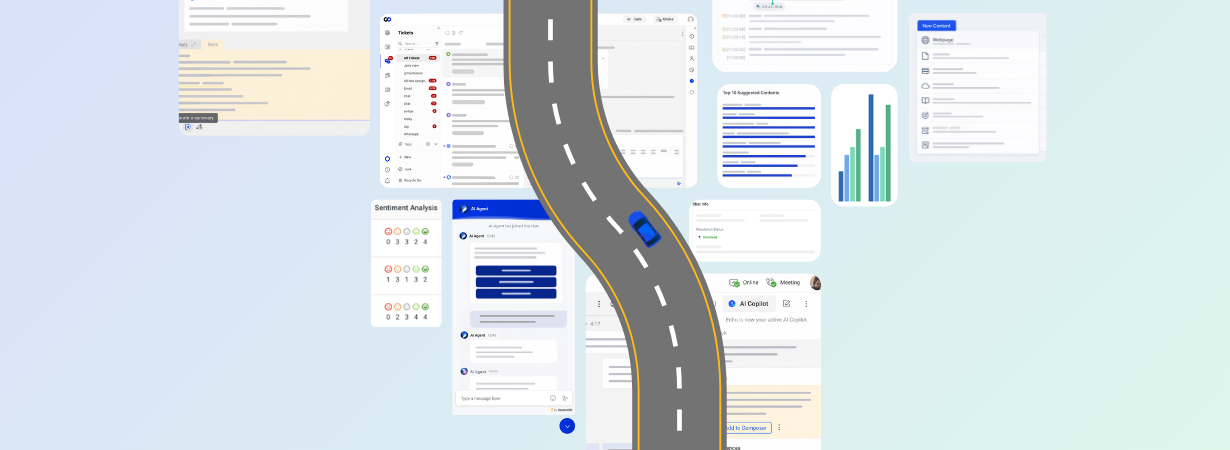The best support agents in any organization are easily recognizable; they remain calm under pressure, are lightning-fast with their answers, and are extremely detail-oriented. Now imagine giving every agent on the team the same superpowers.
That’s the promise of AI Copilots. They’re not here to replace your team; they’re here to amplify their impact. From surfacing the right information at the right time to rewriting responses with perfect tone and clarity, AI Copilots work behind the scenes to turn every agent into your best performer.
AI Copilots are already being used in many organizations and are rapidly changing the way support agents field queries and go about their day. No more tab-hopping. No more guesswork. Just smarter, faster support.
AI Copilots are completely changing the way support teams work. Let’s explore how AI Copilots are redefining productivity on the front lines of customer service.
What is an AI Copilot and How Does It Work?
An AI Copilot is an intelligent, real-time assistant that works alongside customer service agents during live interactions.
Unlike traditional chatbots that replace human agents, or basic automation that handles simple tasks, AI Copilots are designed to enhance human capabilities by providing instant support, guidance, and intelligence exactly when agents need it most.
AI Copilots combine multiple AI technologies, natural language processing (NLP), generative AI, large language models (LLMs), and machine learning, into one system. Together, they:
- Analyze conversations in real time (detecting context and sentiment).
- Suggest accurate and relevant responses instantly.
- Refine outputs continuously as they learn from interactions.
This seamless integration happens in milliseconds, providing agents with intelligent, real-time assistance that understands both the technical aspects of queries and the human elements of customer communication.
Experience AI Copilots in Action
Discover how AI Copilots empower agents with real-time insights, streamline workflows, and elevate customer experiences.
View demo
View Demo
Why AI Copilots are Becoming Integral to Quality Support
Even the most seasoned support teams are feeling the pressure. Volumes are climbing, expectations are on the rise, and the margin for error? Smaller than ever. While many teams have leaned on automation and self-serve tools to ease the load, there’s still a gap, and it’s squarely on the shoulders of frontline agents.
As companies accelerate their move toward automation and integrate more AI into their customer service strategies, expectations for support teams are rising just as quickly. Leaders are looking for faster response times, greater personalization, and continuous coverage, all while keeping costs in check.
But with these elevated expectations comes mounting pressure on support teams:
- More inquiries
- More complex customer issues
- More channels to cover
All while trying to maintain CSAT, hit SLAs, and keep your team from burning out. Traditional systems and siloed knowledge bases just can’t keep up with that pace.
For instance, it’s increasingly common for a customer or a prospect to start a conversation on another channel, like email, but then pivot to live chat or even telephone. Agents are expected to have an organized view of the communication across multiple platforms. With an AI Copilot, they are much better equipped to handle such issues.
Tackling Cognitive Load
Your agents aren’t just answering questions; they’re toggling between systems, scanning help docs, digging through internal threads, rewriting responses, and double-checking tone. It’s not just inefficient; it’s exhausting. And the toll is real: over 80% of support agents say the pressure of their role harms their mental well-being, with 95% reporting a direct hit to their productivity. There’s a constant bombardment of information, and it’s left to the agents to know how to quickly find the answer, rephrase it, and then send it to the respondent. Naturally, with rising support expectations and volumes, things can get out of hand. AI Copilots keep everything in one place and can even help with conversational marketing.
Simplifying Knowledge Access
When an agent says, “Just one moment while I check on that”, behind the scenes, they’re scrambling, jumping between help docs, scanning internal wikis, digging through Slack or Teams threads, and maybe even messaging a teammate for backup.
They’re not stalling. They’re searching.
Most support teams aren’t lacking information. They’re drowning in it. There are policies, product updates, training docs, and knowledge bases. But when a customer is waiting, it’s not about how much information exists, it’s about how quickly and confidently an agent can access the right piece of it.
This is where an AI Copilot changes everything. It listens in real time, understands the conversation and its context — including past interactions, customer history, and intent — and surfaces the most relevant answers from trusted sources automatically. No more breaking flow. No more guesswork.
Faster Onboarding and Training
A key benefit of implementing AI Copilot is the significant reduction in training times. An AI Copilot can be used to offer real-time coaching to new agents, sharply reducing ramp-up times and cutting training hours. That’s not to say that the quality of training suffers; it just becomes much easier to train new agents because they don’t have to spend time combing through manuals or extensive tutorials.
Inconsistent Issue Resolution
Inconsistent responses hurt your brand more than you think. Imagine this: two users reach out with the same question about a withdrawal. One agent gives a short, polite answer.
The other adds more detail, explains the timeline, and offers to follow up. Both responses are technically correct, but to the player, they feel completely different. Naturally, this impacts the quality of support, as the player who didn’t get a detailed answer is likely to ask for clarification, or worse, may get frustrated.
It’s not just about confusion. When users get mixed messages, it chips away at their confidence in your support team. It can make your brand seem unreliable, even if the information is accurate.
Over time, these inconsistencies don’t just frustrate players; they create extra work for your team. One agent sets one expectation, another sets a different one, and someone else has to reconcile the inconsistency later.
Most of the time, this isn’t about carelessness. It’s about scattered knowledge, unclear guidelines, and the reality that every agent has a different communication style. Everyone is doing their best, but they’re not always pulling from the same source.
That’s where AI Copilots can help create and maintain uniform engagements. An AI Copilot gives agents consistent, approved language in real time — no searching, no second-guessing. Whether it’s a quick confirmation or a sensitive issue, the response matches your brand voice and delivers the right message, every time.
You don’t need to build new processes or train everyone to write the same way. You just need to give them the right tool, and let the Copilot do the alignment for you.
Significantly Boosting Agent Productivity
Support teams are under pressure to move fast, stay accurate, and handle more inquiries across more channels, without sacrificing the quality of the experience. But the reality is, agents spend too much of their time doing things that don’t require their full skill set.
They’re digging through knowledge bases, toggling between systems, rewriting replies, and rechecking tone before they hit send. It’s time consuming. It slows them down. And it keeps them from focusing on what actually moves the needle: solving problems and helping customers.
An AI Copilot lifts that weight. It gives agents the right answers right when they need them, rewrites responses to match your voice, and handles the repetitive stuff, like summarizing conversations or drafting follow-ups.
See AI Copilots Solve Support Challenges
Give your team AI-powered support that reduces workload, accelerates response times, and ensures consistent, high-quality service across every channel.
View demo
View Demo
AI Copilots in Customer Service: Main Use Cases
Now that we’ve talked about just how AI Copilots support teams in customer service, let’s look at some of the most important use cases:
| | |
| Provides instant, contextually relevant responses for high-volume interactions. | University admissions teams can instantly surface accurate application deadline info during peak season. |
| Agents can directly ask questions and get answers from the AI Copilot without leaving the support console. | Agents can ask questions about complex accounts, instead of having to manually sift through documentation. |
| Crafts original, detailed explanations for complex scenarios. | Explaining new policies, troubleshooting technical issues, or guiding customers through multi-step processes. |
| Improves tone, grammar, and formality to meet professional standards. | Ensures communications sound clear, empathetic, and consistent across enterprise teams. |
| Generates concise summaries of long interactions for compliance, training, or process improvement. | Captures key decisions, next steps, and resolution details automatically. |
| Automates post-conversation work by populating fields in CRM systems, syncing records, and triggering workflows. | Reduces after-call work (ACW), ensures accurate data entry, and supports compliance documentation. |
Quick Suggestions for High-Volume Enterprise Environments
Organizations handling thousands of daily interactions require AI that accelerates response times without sacrificing accuracy. For instance, quick suggestions can be used to provide instant, contextually relevant response options for agents dealing with complex organizational scenarios.
When a university admissions counselor receives inquiries about application deadlines during peak enrollment periods, the AI Copilot instantly surfaces the most appropriate responses based on the student’s program of interest, application status, and current academic calendar.
In-Console AI Copilot with Historical Context Integration
Enterprise support teams managing complex customer relationships across multiple touchpoints need AI assistance that goes beyond simple suggestions to provide comprehensive, evidence-backed guidance.
An in-console AI Copilot delivers real-time assistance while maintaining separate conversation contexts and surfacing relevant historical data.
When a credit union member service representative handles a complex account inquiry, the AI Copilot automatically analyzes the conversation context and provides suggested responses alongside reference links and related past tickets showing how similar issues were successfully resolved.
The agent can review these real-world examples, adapt the AI’s suggestion to match the specific situation, and insert the refined response with one click, all without leaving the conversation interface or losing valuable context.
Generative Suggestions for Complex Communication Scenarios
Beyond pre-written responses, enterprise AI Copilots must handle sophisticated, nuanced communications that require original content creation. Generative Suggestions enable agents to craft detailed explanations for complex policy changes, technical procedures, or multi-step processes.
Key applications for generative capabilities include:
- Policy explanation for complex regulatory or institutional changes
- Technical troubleshooting guidance customized to specific user environments
- Multi-step process explanation that guides customers through complex procedures
- Personalized follow-up communications based on interaction history and outcomes
- Stakeholder-specific messaging adapted for different organizational roles and responsibilities
For instance, when an iGaming operator’s VIP support team needs to explain new responsible gaming protocols to high-value players, the AI Copilot generates personalized communications that address the player’s specific gaming patterns and preferences.
Text Enhancements for Professional Communication Standards
Text Enhancement capabilities ensure every customer interaction meets brand voice requirements by refining tone, correcting grammar, and adjusting formality levels appropriate to the context, especially in enterprise environments.
For example, when a large financial institution’s customer service agent responds to a loan application inquiry, the AI Copilot automatically refines the agent’s draft response to ensure it meets the bank’s formal communication standards.
Summarizing Comprehensive Documentation
Large organizations require detailed documentation for compliance, training, and operational improvement purposes. Summarization features automatically generate concise, accurate summaries of complex interactions, capturing key decisions, action items, and resolution details.
Let’s say an insurance claims adjuster completes a complex property damage assessment involving multiple stakeholders. They could leverage the AI Copilot to automatically generate a comprehensive summary that captures all critical details.
Smart Wrap Ups
AI Copilots can efficiently wrap up conversations, representing a significant advancement over standard AI tools by automatically populating custom fields across enterprise systems. Some of its key benefits include:
- Automatic field population in CRM and specialized enterprise systems
- Workflow trigger activation based on conversation outcomes and customer profiles
- Compliance documentation generation with complete interaction records
- Cross-system data synchronization to maintain accurate customer records
- Reporting integration for performance metrics and operational analysis
A common scenario is whenever an iGaming operator’s support agent resolves a VIP player’s withdrawal request, the AI Copilot automatically populates critical fields across multiple compliance systems.
Live Chat Benchmark Report 2025
Uncover how your performance compares across satisfaction, wait times, response times & more.
Download the report
Report
How to Measure the ROI of AI Copilots
Implementing AI Copilots for your support team is an investment, not just in the technology per se, but also in your team’s performance and your customers’ experiences. Measuring ROI isn’t about one magic number. It’s about understanding how AI is improving speed, quality, efficiency, and satisfaction across the board. Here are some key metrics that’ll help you track it effectively.
The first contact resolution tells you how often a customer’s issue is fully resolved in the first interaction. AI Copilots help agents give more complete answers, reducing the need for follow-up.
With advanced capabilities, AI Copilots make it easy for agents to resolve conversations on first contact. A simple way to track this would be to evaluate FCR before implementation and after. Managers can also segment FCR by type of inquiry, such as billing or support, to determine the biggest lift.
2. Cases per Hour
One way to measure agent productivity is to track the number of cases per hour. For instance, in iGaming, agents often take on multiple chats, many of which are resolved instantly. It reflects both speed and support capacity, and an AI Copilot helps improve both.
This also gives organizations a good productivity benchmark to compare new hires with seasoned support agents. Managers can closely track performance and how it improves over time with the implementation of an AI Copilot.
3. CSAT Scores
This one’s fairly obvious. Customer satisfaction is one of the clearest indicators of how well your support team is performing, and it’s directly impacted by response speed, tone, and accuracy. When an AI Copilot helps agents respond faster and with more confidence, customers notice.
To track the impact, monitor CSAT scores before and after implementing the Copilot. You can use simple post-interaction surveys that ask customers to rate their experience on a scale (usually 1–5). Pay attention to trends over time and segment the results by agent, channel, or whether the Copilot was used in the conversation.
Look for improvements in both the score and the volume of positive feedback. If you’re seeing more 4s and 5s and fewer “It took too long” comments, that’s a sign the Copilot is doing its job.
4. Agent Satisfaction and Retention
When agents have to search across systems, reword replies, and constantly second-guess their answers, it slows them down and wears them out. A Copilot reduces that friction. It helps agents feel more supported, capable, and focused, and that translates into higher satisfaction and stronger retention.
To track this, gather regular feedback from your team through short internal surveys. Ask about their confidence, workload, and how helpful they find the Copilot in daily tasks. Look for comments like “I’m not jumping between tabs as much” or “It saves me time writing responses.”
You can also compare retention trends over time. If your team is staying longer and reporting fewer frustrations with tools or processes, the Copilot may be playing a key role in creating a better work environment.
5. Putting It All Together: Calculating ROI
Look at how your team performed before the Copilot, then compare it to what’s happening now. Are agents handling more cases in less time? Are CSAT scores going up? Are new hires getting up to speed faster? Are your senior agents spending more time solving problems and less time rewriting replies?
Tracking the impact of your AI Copilot isn’t about chasing one big number. It’s about watching for consistent improvements across the areas that matter most: faster response times, better answers, more productive agents, and happier customers.
You can also look at what the Copilot helps you avoid. Fewer escalations. Fewer back-and-forths. Less time wasted on repetitive tasks. That’s time and money saved, and support quality gained.
You don’t need a perfect analytics setup to see the ROI. If your team is moving faster, staying consistent, and delivering better experiences with less effort, the value is already there.
Embrace the Future Today
AI Copilots aren’t just another tool in your tech stack, they’re a shift in how customer service teams work. They take the pressure off agents, speed up every interaction, and make support more consistent and accurate across the board.
Don’t let your competition beat you to the punch. AI Copilots can be the difference between good and excellent support, giving you an opportunity to stand out. You’re not just looking at better metrics after implementation, but also a much better experience for your customers, your team, and ultimately, your business.
As expectations keep rising and complexity grows, the organizations that invest in smart, real-time support systems will be the ones that stay ahead. An AI Copilot doesn’t replace the human touch — it makes it better.
Transform Your Support with AI Copilots
Don’t get left behind — see how AI Copilots can future-proof your customer service and give your team a competitive edge today.
View demo
View Demo








